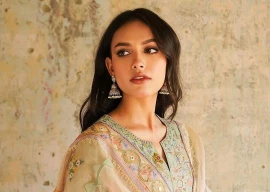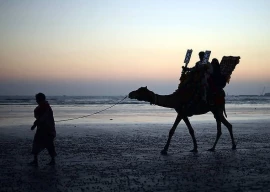
For many the mere mention of Wana conjures up images of ferocious Taliban fighters and a medieval, patriarchal society. If you also think so, people like Maria Toorpakai Wazir makes you think again. Toorpakai, who hails from Wana, the headquarters of the South Waziristan tribal agency, the birthplace of the dreaded Tehreek-e-Taliban Pakistan, is a top female squash player of Pakistan. She has been consistently winning laurels.
On Saturday, 22-year-old Toorpakai claimed the inaugural Nash Cup Ladies Tournament in Ontario, Canada, beating Milou van der Heijden of the Netherlands. It was the third international title after she won the Southwest Squash Open and the Liberty Bell Open last year in the United States. Currently, she is ranked 55th in the world.
Toorpakai’s story is one of courage, perseverance and hard work. She fought against odds to pursue her passion: squash.
“I used to dress up like boys and play with my brothers because girls [in the conservative society] were just supposed to be indoors doing domestic chores. I was always into sports, I always wanted to play outside so the only way was to disguise as a boy because people won’t let their girls go outside,” Toorpakai told The Express Tribune in a 2010 interview.
Toorpakai shifted to Peshawar in 1999 where she joined the Hashim Khan Complex – but not as a female player. “At the gym I pretended to be a boy because there were no women players there back then, it was only after a couple of months that everyone at the gym found out that I was a girl,” Toorpakai had told The Express Tribune.

She left Pakistan, disappointed and disillusioned, after the Pakistan Squash Federation turned down her request for more facilities for women players. “It is ironic. I broke away from my tribal background just to get caught with the gender bias in the federation. They like their male players more,” she had said in 2010 interview.
She was also depressed by the rising extremist violence in the country and its impact on sport.
“Since terrorism has damaged sport in Pakistan and we are not hosting any international event anymore, players don’t have a choice,” she had said. Only months after the interview she moved to Canada to join Canadian squash legend Jonathan Power’s National Squash Academy in Toronto.
Pakistan’s national head coach says Toorpakai is beacon for all. “Because of the hardships she has suffered, Toorpakai has become an inspiration not only for players in Pakistan, but for female players all over the world,” said Jamshed Gul. “Players [should] take a leaf out of her book – winning these tournaments as a Pakistani is a source of pride.”
He says Toorpakai should start playing in bigger events to improve her ranking quickly. “She is representing Pakistan quite well internationally. Such victories help in putting forth a positive projection of the country. I can only say that I’m proud of this win, and I hope she will continue to climb up the ranking charts,” said Gul.
Power play
Saturday’s win was not easy for Toorpakai who was faced with top-seeded Milou van der Heijden. However, in the end she managed to vanquish her in straight sets: 13-11, 11-3 and 11-9.
In the first set, Toorpakai played at a high pace, but the opponent resisted well and put up a tough fight. The second set was relatively easy, as van der Heijden made too many errors. In the third set the Dutch player made a comeback, leveling the scores after being 9-5 down. However, Toorpakai held her own, and won the next two points to clinch the title.
“When I win a tournament, I feel that I’m moving towards my goal,” said Toorpakai, according to the official website of the Nash Cup. “Today’s win means a lot to me, as I was nervous. I played well and that helped control my nerves.”
The losing finalist also had words of appreciation for Toorpakai. “She is a very physical player,” stated van der Heijden. “After going 2-0 down, I was not going to just lie down without a fight, but she did play better than me today.”
Published in The Express Tribune, September 22nd, 2013.
COMMENTS (15)
Comments are moderated and generally will be posted if they are on-topic and not abusive.
For more information, please see our Comments FAQ










































Tribal pushtoons of Pakistani side had their own jirga system . and at the end of the day every one is human being . these are just for identification . humans should not be discriminated on any affiliation. I was just saying for identification that we tribal pushtoons do not have all the facilities of high schools , colleges . universities , medical colleges , hospitals , roads, Sports or infrastructure of global development. But still girl like Toorpaki has earned name in the world . and many more coming . I hope u get it now why i used word "Tribal " for tribal pushtoons .
zalmai tribal of Pakistani side did not submit to any raj. they joined Pakistan when asked by quaid e azam after 14 august 1947. correct your history please . Knowing history is not being disrespectful .accept the facts
I realy love maria and her game.I am also a pashtoon girl and I can better understand her feelings.
@ MSM
I know my history very well, but the fact is tribals are Pashtun at the end of the day and calling them by any other name is disrespectful.
Tribal Pashtuns on the Pakistani side did submit to political agents of the Raj.
Tribal pushtoons are different they were free even before 1947 unlike other pushtoons
well zalmia u need to read history , tribals never submitted to british colonial govt unlike other pushtoons
Toorpakai (black locks) is a role model for Pashtun women. ET stop using the colonial era nomenclature (tribal) when naming Pashtuns.
Her own sister Ayesha Gulalai is also an achiever being the youngest MNA in the National Assembly.
Hats Off!!
Inspiring and powerful!
congrats
Many Many congrats Maria( Changeez khan ):-) , I am a tribal like you . I heard you have been to North carolina . I am also at NC. I would like to meet you in case you come back to NC.
inspring and encouraging. good luck
Congrats!